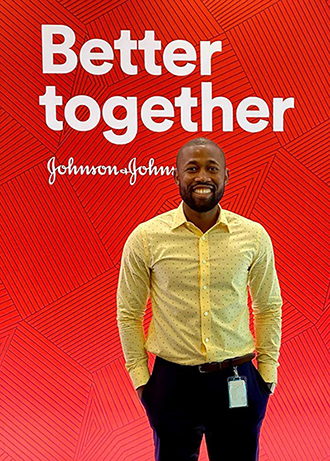Individuals and organizations the world over are intent on improving people’s health outcomes. Their work yields new pharmaceuticals, medical devices, and products to help consumers protect their skin, quit smoking, lose weight, and achieve scores of other positive outcomes.
Nnamdi Ezeanochie is interested in all of these routes to improve health. But he’s also focused on an additional factor: how human behavior figures in the mix. He’s also powerfully positioned to explore that question and positively affect the health of populations around the world.
Ezeanochie, who earned a doctorate in public health from the Community and Behavioral Health program at the Colorado School of Public Health, was recently named Director of Behavior Science at Johnson & Johnson. In that role, he joins the company’s Health and Wellness Solution leadership team.
Ezeanochie said he and his colleagues aim to collaborate with Johnson & Johnson’s business teams by discovering and applying evidence-based strategies that promote healthy behaviors in people. One of the most critical challenges: addressing vaccine hesitancy in sub-Saharan Africa.
“We will approach that problem from a behavioral perspective,” Ezeanochie said. “What are the barriers to administering the vaccine? Based on that, what are the evidence-based strategies that can be effective in changing hesitancy and getting us from [producing] a vaccine to vaccination?”
Digging into digital solutions
In his new position, Ezeanochie brings a strong interest in finding innovative ways to deliver health care with digital tools. He honed his skills at ColoradoSPH’s mHealth Impact Lab, which tests and validates budding digital health solutions. The goal: ensure that everyday people – particularly those at greatest risk of poor outcomes – can conveniently use the products to improve their health.
As a student, Ezeanochie played a pivotal role in building the lab’s infrastructure and helping to implement its goals, said Dr. Sheana Bull, mHealth Impact Lab director and one of his mentors.
“Nnamdi helped us become what we are now, which is a team that helps people design and develop mobile and digital technology that can address health disparities,” Bull said. “We’re focused on improving access to care and quality of care for people who face disparities in health care outcomes.”
Bull noted that Ezeanochie contributed significantly to a National Institutes of Health grant the mHealth Impact Lab received in 2015 to help women in rural Tanzania get better prenatal care and thereby decrease the risk of transmitting HIV to their infants.
For that project, Ezeanochie worked to get patients’ scattered paper medical records digitized and cross-referenced in their primary care locations, Bull said. The effort electronically consolidated records of patients’ visits, tests, and medications. That made it easier for providers to identify women who needed to be tested for HIV or needed to receive antiretroviral medications, Bull said.
In doing so, she added, Ezeanochie demonstrated that digital health solutions can have a profound societal impact.
“Nnamdi helped us to recognize that our work goes beyond the individual to population health,” Bull said.
Tools to meet the patients’ needs
In all cases, Ezeanochie said, interventions that are designed to impact people’s behaviors and improve their health outcomes must be scientifically based and supported by evidence that people will actually use them.
For example, hospital providers might decide that they want patients to meet certain goals before qualifying for surgery: quitting smoking, losing weight, reducing their alcohol consumption and the like. Ideally, engineers might develop a digital system that delivers real-time information to providers so they can manage and monitor their patients’ progress and send motivational feedback. Patients, in turn, could set goals and develop action plans to meet them in preparation for surgery. But success would depend on patients’ willingness and ability to adopt the technology, Ezeanochie said.
“There must be recognition that the patient is part of an ecosystem of providers, friends and families,” he said.
A global perspective
Ezeanochie’s own ecosystem has given him a broad perspective on the world. The Tanzania project was far from his only foray on the global health stage. Among other projects, he worked in Rwanda with Johnson & Johnson’s Global Public Health team on the Umurinzi Campaign, which targeted overcoming Ebola vaccine hesitancy, and on efforts to improve adoption of antipsychotic medications.
Prior to that work, he earned a medical degree from the University of Nigeria and a master’s in public health from the University of Sheffield in the United Kingdom before moving on to ColoradoSPH and the mHealth Impact Lab. He considers himself a “global citizen,” not only because of his own upbringing, education, and travels, but also because he recognizes the world’s interconnectedness, which presents both opportunities and risks, as demonstrated most recently by the COVID-19 pandemic.
“We live in a global village, a flight away from one another,” Ezeanochie said. That fact has made him “passionate and committed to addressing global health issues and bridging inequities and disparities in health outcomes in developed and not-so-developed parts of the world.”
For her part, Bull said she admires the breadth of Ezeanochie’s vision for improving global health and finding solutions that have a positive impact on the greatest possible number of people.
“Nnamdi’s success is so gratifying for me personally,” Bull said. “This is what we hope to do as educators — to see our students not only succeed professionally but also rise to positions of leadership that will be impactful.”





